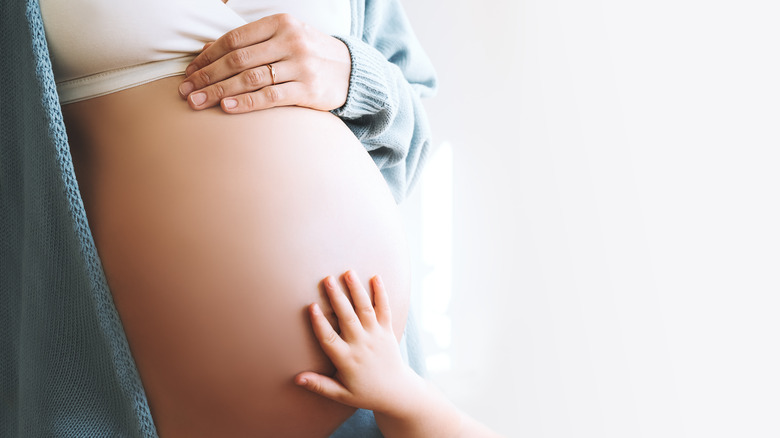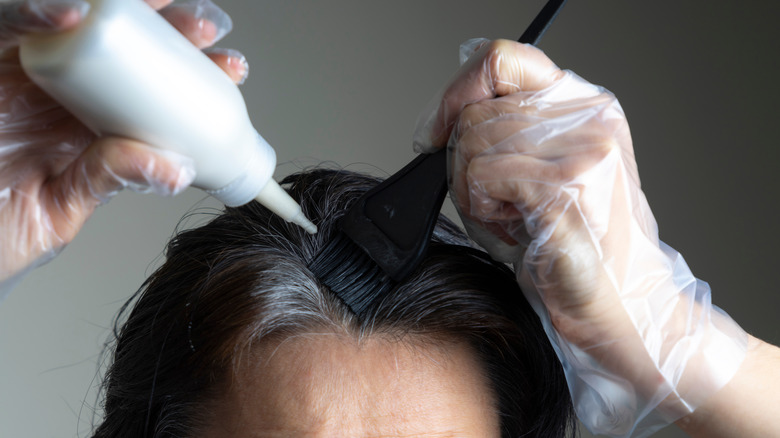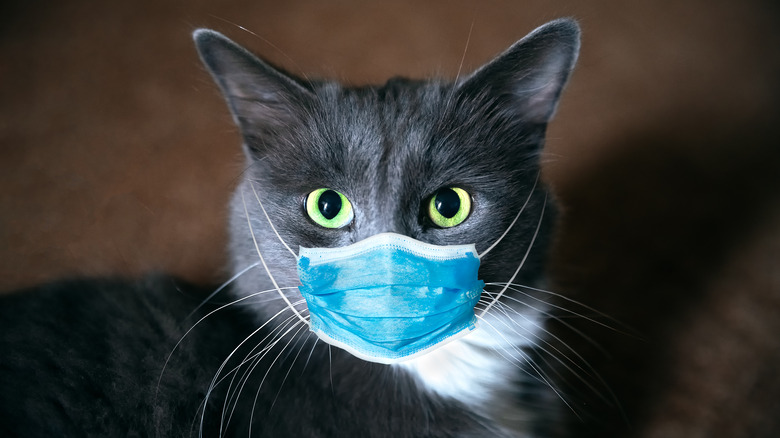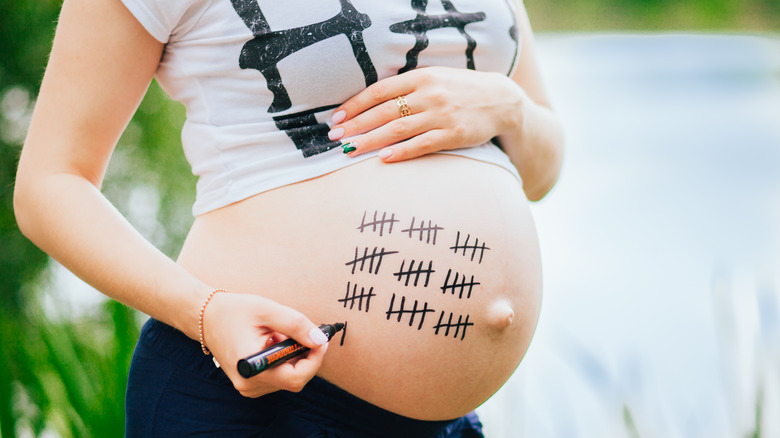Myths You Should Stop Believing About Pregnancy
Data from MIT Technology Review in 2019 shows that nearly 90% of American women have a baby during their childbearing years. In fact, according to the The World Bank, the total number of births per woman is 2.4.
However, little is scientifically known about pregnancy, including placenta formation and how to time a birth. Anne Drapkin Lyerly, a bioethicist and obstetrician at the University of North Carolina at Chapel Hill, believes that one reason for this is that no explanation is needed for excluding pregnant women from research. However, "If you want to include her, there's a whole slew of paperwork and decisions, and you have to justify your decision" (via The Washington Post).
As a result of the lack of information, according to Catherine Spong, chief of maternal-fetal medicine at the University of Texas Southwestern Medical Center, medical professionals are "providing care in the absence of data" (per The Washington Post).
Additionally, cultural beliefs and practices in pregnancy and childbirth remain worldwide. Myths surrounding pregnancy incorporate almost every aspect of life, from nutrition and physical activity to delivery (via the Malaysian Journal of Medical Sciences). Let's take a look at some of the myths about pregnancy you should stop believing.
Myth: Dyeing and bleaching your hair is dangerous for your fetus
Since many hair dyes contain chemicals, pregnant women worry that by changing their hair color, they're exposing their unborn child to toxins (via Healthline).
However, a study of more than 2,000 pregnant women showed that of the over 75% that dyed their hair, doing so did not affect the child's Apgar score (via International Journal of Women's Health and Reproduction Sciences). Apgar stands for Appearance, Pulse, Grimace, Activity, and Respiration and assesses a baby's medical needs at birth (via Johns Hopkins All Children's Hospital).
Dr. Daniel DiSabatino, obstetrician-gynecologist at Axia Women's Health Cherry Hill, recommends waiting until your second trimester to dye your hair. "The first trimester is a critical period when many of your baby's key organs, like the brain and spinal cord, are developing. Therefore, it's best to play it safe and wait until the second trimester to dye your hair" (via Forbes).
It is also recommended you wear gloves and work in a well-ventilated area when dyeing your hair. It would help if you also rinsed your scalp after applying the dye and did not leave it in for an extended period (via the NHS). The same holds for the use of bleach (via the Cleveland Clinic).
Dr. Salena Zanotti, Ob/Gyn, reminds everyone that while taking safety precautions is important, "your skin is a strong barrier that keeps the hair dye from getting inside your body. Chemicals in hair dyes don't get absorbed into the body if you have a healthy scalp" (per the Cleveland Clinic).
Myth: Caffeine causes pregnancy problems
More than 80% of American women of reproductive age consume a caffeinated beverage daily (via American Society for Nutrition).
Caffeine is found in coffee, tea, sodas, energy drinks, chocolate, and some medications. The amount of caffeine in the food and drink you consume varies based on the brand, how the item is prepared and served, and the size of the serving (via March of Dimes).
Caffeine is a stimulant that improves mental alertness and increases physical energy. It also causes your heart to beat faster (via Better Health Channel). Your blood pressure and frequency of urination also go up when using caffeine (via American Pregnancy Association). While in the womb, babies don't have the enzymes to metabolize caffeine. Furthermore, caffeine can change your baby's movement and sleep pattern later in pregnancy.
Two studies done in 2008 show significantly different results when it comes to consuming caffeine during pregnancy. One showed an increase in miscarriage, and the other showed no increased risk (via American Pregnancy Association).
A third study done in 2021 published by the American Medical Association showed that caffeine (among habitual consumers) "was associated with lower hypertension risk" and had no effect on gestational hypertension or preeclampsia.
To keep you and your fetus safe, the American College of Obstetricians and Gynecologists recommends consuming less than 200 milligrams of caffeine daily.
Myth: Cats are harmful to pregnant women
According to Pamela Perry, DVM, animal behavior resident of the Animal Behavior Clinic at Cornell University's College of Veterinary Medicine, cats spend up to half of their time licking themselves.
Be that as it may, that doesn't mean your cat is germ-free. Cats that consume rodents or who are fed raw meat are at risk of getting toxoplasmosis. This infection can be transmitted to humans (via The Humane Society of the United States).
However, while pregnant women are more at risk of developing this illness, you would have to touch your cat's feces, not wash your hands, and then put them in your mouth for the germ to affect you. Furthermore, the infection only appears after the poop sits for more than a day, according to The Humane Society of the United States.
The most common way for people to get toxoplasma is from eating undercooked, contaminated meat or shellfish or handling it and not washing their hands (via the Centers for Disease Control and Prevention).
"Toxoplasmosis may cause flu-like symptoms in some people, but most people affected never develop signs and symptoms" (via the Mayo Clinic). Regardless of whether you show signs of infection or not, if your baby is exposed in the womb, you could miscarry, or the pregnancy could end in stillbirth.
Exposure becomes more dangerous as your pregnancy progresses. Other issues include seizures and jaundice. However, most exposed babies don't show signs of infection until later in life. Hearing loss, mental disability, and serious eye infections can occur at that point (per the Mayo Clinic).
Myth: Sex during pregnancy hurts the baby
Unless a medical professional has told you not to — and your pregnancy is progressing without complications — it's safe to have sex. Your baby won't get hurt and won't know what's happening (via the NHS).
Your baby is protected from penetration from fingers, sex toys, and your partner's penis by the amniotic sac and the muscles of your uterus, according to the American College of Obstetricians and Gynecologists (ACOG).
However, many women report cramps and spotting after orgasm and penetration. If the bleeding becomes heavy, contact your doctor (per ACOG).
Having sex has not been proven to cause miscarriages. Still, it should be avoided if you're leaking amniotic fluid, have been diagnosed with either cervical incompetence or placenta previa, or have a history of preterm labor or premature birth (via the Mayo Clinic).
That being said, sex also doesn't induce labor. A study out of the University of Malaysia showed that pregnancy length remained the same for the more than 1,100 women involved, regardless of sexual activity.
Myth: You glow during pregnancy
Some might say that you are gleaming with happiness when pregnant. Others suggest that the radiance you project helps determine the sex of the child you're carrying (via Healthline). Your skin is stretching and looks flushed. The changes in your body as it creates another person results in skin that is oilier than usual, according to Insider Inc.
Pregnancy causes the blood in your body to become almost double what it is typically, and some of this new blood flows to your face. Additionally, the amount of the hormone progesterone that your body produces also increases. As a result of these escalations, your cheeks become rosier, and you appear to have a luminous glow (per Sanford Health).
Body changes associated with pregnancy also result in skin problems. The oil that gives you the glow can clog pores and cause acne, explains Sanford Health. Other women aren't as lucky and end up with melasma, or what is referred to as the "mask of pregnancy." This condition results in splotchy dark spots on the forehead and cheeks. It results from pregnancy hormones increasing your pigmentation and sensitivity to the sun (via Lancaster General Health).
It's recommended that you wear sunscreen when venturing outside. The discoloration will diminish after your delivery (via Johns Hopkins University).
Myth: Eating spicy food induces labor
In an effort to expedite the meeting of the newest family member, some women turn to non-medical ways to start the labor process. Nearly half of the participants in a 2011 survey attempted to induce their labor (via Birth Issues in Prenatal Care). Of those that tried a non-medical method to induce labor, more than 10% tried to do so by eating spicy food.
While eating spicy food seems safe, no studies prove its efficacy in inducing labor (via Journal of Perinatal Education). Eating spicy foods during pregnancy stimulates your intestines, which might lead to uterine contractions if you get diarrhea. If diarrhea doesn't jump-start your uterus, it could result in dehydration which isn't good for you or the baby (via Lancaster General Health). Additionally, spicy foods also cause heartburn and indigestion for many pregnant women (via GoodRx).
Non-traditional methods of inducing labor remain elusive. Jonathan Schaffir, associate professor of obstetrics and gynecology at Ohio State University, reminds everyone, "By and large, labor is an issue that women have little or no control over. The best, safest thing is to let Mother Nature take its course" (via Time)
Myth: A full moon induces labor
Since ancient times, people have believed that the moon has had some control over human biology and behavior, including when a woman would get pregnant and go into labor (via International Journal of Medical Research & Health Sciences).
Studies on the moon's influence on birth rates have proven inconclusive. For example, an extensive survey of more than 500,000 births over 60 lunar cycles showed no statistical differences in birth rates from one phase to another (via American Journal of Obstetrics and Gynecology).
However, a 2017 study of just over 8,000 births over a year found that nearly 15% more children were born during a full moon than during other times of the month, according to the International Journal of Medical Research & Health Sciences.
People may believe that the moon affects childbirth because the moon's cycles affect tidal activity, which usually increases when there's a storm, and barometric pressure is low (via Forbes). Lower barometric pressure correlates, at least anecdotally, to more babies being born (via Duke University Health System).
Myth: If you have heartburn during pregnancy, your child will have a lot of hair
Researchers at John Hopkins University set out to dispel this myth. However, their small-scale study of 64 women and their children told a different story (via Birth). Of those involved in the study, nearly 80% reported some heartburn, and 28 stated their pain was moderate or severe. Twenty-three of the women who reported higher than average levels of heartburn gave birth to children with normal to above average amounts of hair. Additionally, 10 of the 12 who said they had little to no heartburn had children with little or no hair.
Leissa Roberts, associate dean and a certified nurse midwife at the University of Utah College of Nursing, cautions, "This was a small study with only 64 participants. This simple link does not prove a cause-and-effect relationship."
Medical professionals don't believe that the hair itself causes heartburn. Instead, they blame high levels of estrogen and other hormones associated with pregnancy. These same hormones cause your sphincter at the bottom of your esophagus to relax, resulting in heartburn. At the same time, these hormones also hold some responsibility for the amount of hair your child grows in utero (via The New York Times).
To reduce the discomfort associated with pregnancy heartburn, avoid spicy, greasy foods, citrus, and chocolate. It is also recommended that you eat smaller meals more often and don't lie down immediately after eating. Speak with your doctor if symptoms don't improve, and know that once you give birth, your heartburn should subside (via Johns Hopkins Medicine).
Myth: You should eat for two while pregnant
Regarding eating and nutrition, most pregnant women focus on ensuring they get enough food for themselves and their growing fetuses (via Women's Health Issues).
One problem with this is that pregnant women generally don't think about their weight and gain more than the recommended amount of 25 to 35 pounds. Furthermore, for women considered overweight or obese, pregnancy is the one time in their lives when they're not judged for the amount they eat (per the Maternal and Child Health Journal).
Surprisingly, the American College of Obstetricians and Gynecologists (ACOG) offers no recommendations to its members on how to approach their patients about weight gain recommendations. Additionally, ACOG doesn't mention gestational weight gain in any of its patient literature, according to Women's Health Issues.
A study published in the American Journal of Obstetrics and Gynecology showed, "Approximately 40% of normal-weight and 60% of overweight women gained excessive weight during pregnancy." In addition, more than 25% of obese pregnant women involved in the study gained over 35 pounds.
Medical professionals recommend that pregnant women eat an additional 300 calories above their usual daily intake. This equates to one piece of bread, an ounce of cheddar cheese, or drinking 8 ounces of low-fat milk (via Sutter Health).
Myth: You shouldn't take a bath while pregnant
More than three-fourths of female adults in the United States shower daily, and close to one-third take a bath to keep clean. However, the temperature of these activities has some cutting back due to concern for their unborn. While showers usually remain between 101-106 degrees Fahrenheit, some women bathe in water up to 113 degrees Fahrenheit (via Risk Analysis).
Researchers at Environmental Health examined the data from more than 6,000 women who participated in a National Birth Defects Prevention Study (NBDPS). The babies were delivered between 2000-2007. NBDPS looked at the risk of children developing at least one of 13 different congenital disabilities under specific conditions. Environmental Health specifically studied the correlation between bathing and abnormalities — they found some connections between baths that lasted longer than 15 minutes and gastroschisis. However, after taking into account age, body mass index, education level, race/ethnicity, income, parity, folic acid use, smoking, and season of conception, results showed, "bath length was not significantly associated with risk for any birth defect."
Furthermore, a study by the British Journal of Sports Medicine in 2019 found that bathing for up to 20 minutes in water around 104 degrees Fahrenheit did not significantly raise the core body temperature.
Signs you're too hot include feeling hot and sweaty and your skin turning red. Also, it's important to note that feeling overheated could also make you dizzy and nauseous and cause you to faint (via Healthline). And bubbles, bath bombs, and oils could cause uncomfortable yeast infections — and not all yeast-infection treatments are safe for pregnant women.
Myth: You can have alcoholic beverages during pregnancy
The CDC's 2022 Morbidity and Mortality Weekly Report found that close to one in seven pregnant women had an alcoholic beverage over the last month, and nearly one in 20 said they had at least one episode of binge drinking over the same period. Binge drinking is when you drink four or more alcoholic beverages in two to three hours (via March of Dimes).
These figures help partially explain why alcohol consumption during pregnancy is the leading cause of congenital disabilities. When a pregnant woman drinks, her fetus breaks down alcohol slower than she does, so the baby is exposed for an extended period (via Johns Hopkins Medicine).
There is no type of alcohol that is safer than any other. Whether you drink a glass of wine, can of beer, or shot of liquor, all have about the same amount of alcohol. Additionally, mixed drinks could have as much as twice the alcohol (via National Institute on Alcohol Abuse and Alcoholism).
Drinking alcohol during pregnancy ups your risk of having a miscarriage or stillbirth. Your child becomes at greater risk of preterm birth or low birth weight. Growth and development problems and issues with their heart and vision are also increased. Children born to women who drink could develop fetal alcohol spectrum disorder with problems that last all of their lives (via March of Dimes).
The National Institute on Alcohol Abuse and Alcoholism recommends stopping drinking as soon as possible because the sooner you stop drinking, the better it is for your baby.
Myth: There are several ways to determine your baby's sex during pregnancy
According to Dr. Stephen Carr, director of the Prenatal Diagnosis Center and maternal-fetal medicine diagnostic imaging at Women & Infants Hospital of Rhode Island in Providence, close to 85% of couples want to know the baby's sex before delivery (via LiveScience). An ultrasound is the most common way to determine whether you're having a boy or girl. Medical professionals have been using these devices to monitor fetus development since the 1970s, and they have a 90%+ rate of accuracy.
Several other medical tests can reliably determine the sex of your unborn child, including Chronic villus sampling (CVS), which identifies Down syndrome, and Amniocentesis, which helps detect fetal developmental issues (via Healthline).
There are several non-medical ways that parents-to-be try and determine the sex of their child. Most have a 50-50 chance of being correct, according to What To Expect.
One method some use is the baby's heart rate. Babies with a heart rate over 140 are believed to be female, and those with a lower rate are boys (via Healthline). However, Fetal Diagnosis and Therapy studied nearly 500 sonograms done between 18-24 weeks of pregnancy. The boys had average fetal heart rates of 155, and the girls' fetal heart rates averaged around 152.
How you carry, what you crave, and how bad your morning sickness is are other ways people try and predict the sex of an unborn child. Unfortunately, tests have found them all inaccurate (via LiveScience).
Myth: You should sleep in a specific position while pregnant
According to a US National Sleep Foundation study, nearly 80% of pregnant women don't sleep well (via Pakistan Journal of Medical Sciences).
Your growing uterus, hormonal changes, nighttime hunger, and nausea often make sleep more difficult (via Medical News Today).
The Sleep Foundation recommends that pregnant women curl their legs and sleep on their left side to ensure optimum blood flow throughout the body. However, while sleeping on your right side isn't optimal, it is satisfactory. Extra pillows, especially between your knees, help alleviate pain and make side sleeping more comfortable.
If you sleep on your back, your uterus can block veins and interfere with blood flow. Additionally, your growing belly will make stomach sleeping uncomfortable, explains the Sleep Foundation.
However, two studies, one in 2018 and one in 2019, offer conflicting results on whether or not a particular sleep position is required during pregnancy. The 2018 study was published in the Journal of Clinical Sleep Medicine and found that women who refrained from sleeping on their backs, especially in late pregnancy, provided health benefits to both mother and child without interfering with the amount of time the women slept or the quality of their sleep.
Dr. Robert M. Silver, University of Utah School of Medicine, published a study funded by NIH's Eunice Kennedy Shriver National Institute of Child Health and Human Development. The analysis found that, "Sleeping on the back or side through the 30th week of pregnancy does not appear to increase the risk of stillbirth, reduced size at birth, or high blood pressure disorders of pregnancy."
Myth: You will have your baby on your due date
Most due dates are determined using what is known as Naegele's rule. You take the first day of your last period, add a year, subtract three months, and then add seven days (via Today).
However, this method doesn't consider that not all women have predictable cycles that always last exactly 28 days (per the Cleveland Clinic). Therefore, barring complications, only 4-6% of babies are born on their due dates, according to BBC News.
Dr. Michael Cackovic, MD, an OB-GYN with The Ohio State University Wexner Medical Center, says that while "only 6% of women deliver on their due date ... 70% of women will have their baby within 10 days of their due date" (via Today)
Studies released by the BBC put the percentage at 4.4%, with 90% entering the world within two weeks of the predicted due date.
Professor Jason Gardosi, Perinatal Institute, reminds pregnant women that due dates help to "determine the other milestones in pregnancy" (via BBC). And Dr. Cackovic believes the most accurate way to date a pregnancy is with an ultrasound done between six weeks and eight weeks plus six days. "The reason why is there's very little variation that can be detected in a measurement from that time," Dr. Cackovic says. "Pretty much all pregnancies are equal at that stage" (via Today).
A study referenced by Clinics in Perinatology confirms most babies are born within five days of due dates confirmed through ultrasound. However, the only way to be 100% certain of your child's actual day of arrival is to schedule an induction or cesarean section.















